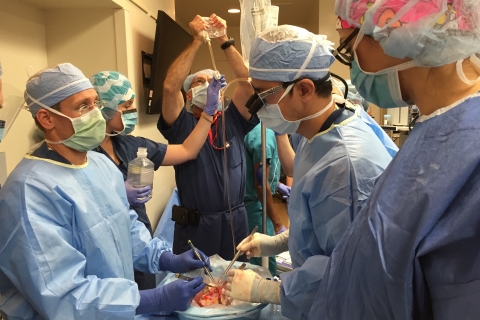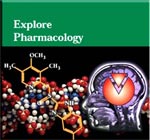 The broad scope of interests of pharmacology ranges from the study of intermolecular reactions of chemical constituents of cells with drugs to the effects of drugs and established therapeutic agents on mammalian physiological organ systems. Professional pharmacologists tend toward careers in basic research and teaching in academia, research in pharmaceutical or biotech companies, research institutes, or government agencies.
The broad scope of interests of pharmacology ranges from the study of intermolecular reactions of chemical constituents of cells with drugs to the effects of drugs and established therapeutic agents on mammalian physiological organ systems. Professional pharmacologists tend toward careers in basic research and teaching in academia, research in pharmaceutical or biotech companies, research institutes, or government agencies.
Pharmacology is the science concerned with all aspects of the action of drugs and other chemicals on living systems. Its primary aim is the discovery of chemical mechanisms by which cellular and molecular functions are regulated for the purpose of understanding how existing drugs act and to develop new drugs for treatment and diagnosis of human diseases.
For more information on a career in Pharmacology, download the brochure, "Explore Pharmacology" (pdf).
This brochure was created by ASPET (American Society for Pharmacology and Experimental Therapeutics).
NRC Ranking
Ranked among the Top 5 programs by the National Research Council (NRC) (September 28, 2010)
Ranked among the Top 2 in Student Support and
Ranked among the Top 4 in Research!
To view the report in its entirety, go to http://www.nap.edu/rdp/ "A Data-Based Assessment of Research-Doctorate Programs in the United States: Data Table" in Excel (2010)
History
Over the past two decades, faculty in the Medical Pharmacology Program have served as research advisors and mentors to many of the 190 Ph.D. and 250 M.S. graduates of the former Interdisciplinary Program in Pharmacology and Toxicology. We boast a diverse student population that has equal representation of both genders, and is made up of individuals who come from all walks of life, from all parts of the United States and from many countries.
Our students' credentials include undergraduate degrees in a variety of science and non-science majors from large universities and colleges to smaller institutions, or prior work experience relevant to pharmacology or related disciplines, or advanced degrees in other disciplines. Our Ph.D. students graduate, on average, less than 5 years of training under the program, and go on to highly competitive postgraduate positions in universities, industry or government agencies. Our alumni are represented in upper management, directors of research in large and small pharmaceutical companies, professorships in academic institutions, as well as in other positions in medicine, law or pharmacy.
Research Facilities
State-of-the-art research facilities are available at the Arizona Health Sciences Center. The individual laboratories of each research group are well equipped with modern research instrumentation for routine and specialized needs.
Research Areas
- Cardiovascular Pharmacology
- Clinical Pharmacology
- Immunopharmacology
- Molecular & Biochemical Pharmacology
- Neuroscience and Pain
- Toxicology
Individual Development Plans
The concepts of mentoring plans and IDPs are not new, but recognition of their role and effectiveness in research training is fairly recent. The Federation of American Societies for Experimental Biology (FASEB) and the National Postdoctoral Association have been early proponents of the use of IDPs for postdoctoral career planning. Excellent examples of IDPs can be found on the Web sites of these organizations:
For more information go to https://www.nigms.nih.gov/training/strategicplanimplementationblueprint/...
My Individual Development Plan (myIDP)
A Career Planning Tool for Graduate Students and Postdoctoral Scholars - http://www.faseb.org/Professional-Development-and-Diversity-Resources/Pr...
Contact Info:
Medical Pharmacology, Director of Graduate Studies
Tally Largent-Milnes, Ph.D.
Office: (520) 626-6400
Email: tlargent@arizona.edu
Medical Pharmacology Program Coordinator
Stephanie Schaller
Office : (520) 626-7218
Email: slschaller@arizona.edu
Application Deadline: December 1st


